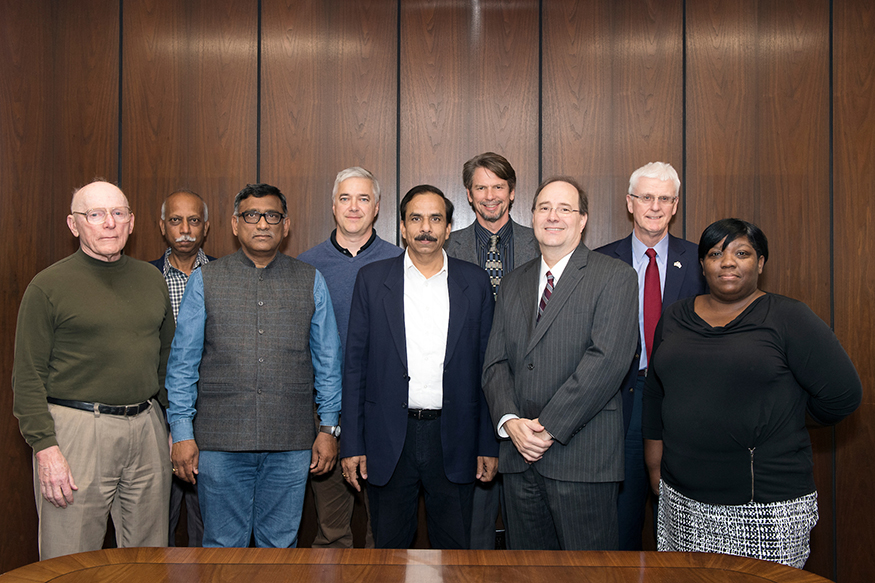
Contact: James Carskadon
STARKVILLE, Miss.—A group of researchers from India’s Jawaharlal Nehru University is visiting Mississippi State this week [March 22-28] as the institutions continue to build on successful partnerships.
The two universities are collaborating on research projects that could make a significant impact on air, water and soil quality. The primary research efforts have focused on the use of biochar, a charcoal-like material made of agricultural waste, to enhance soil fertility, increase water quality and decrease carbon emissions.
MSU and JNU signed a memorandum of understanding in 2015 to formalize their partnerships and commitment to the international collaboration. Much of the collaboration has been spurred by Dinesh Mohan, a professor in the School of Environmental Sciences at JNU and former post-doctoral research associate at MSU from 2005-2007. In 2014, Mohan was named one of the “world’s most influential scientific minds” by Thomson Reuters.
“I really enjoyed my two years here at MSU,” Mohan said. “I was able to make relationships with researchers all across the university and I have received lots of support from the administration. David Shaw (MSU Vice President for Research and Economic Development) has been very supportive of these partnerships.”
In 2014, Mohan and MSU associate professor of chemistry Todd Mlsna were awarded one of eight institutional partnership projects through the Indo-U.S. 21st Century Knowledge Initiative. Their project, titled “Indo-U.S. Initiatives on Cleaner Air and Water Research,” aims to build research partnerships, encourage economic growth and develop junior faculty at Indian and American institutions of higher learning. Mlsna and Mohan collaborated to study the use of biochar for absorbing water pollutants.
“I like to work on practical problems, and clean water is very practical,” Mlsna said. “I teach environmental chemistry, so it’s also relevant to what I’m teaching my students.”
Charles Pittman, an emeritus professor of chemistry at MSU, recently published a paper with Mohan and other researchers that shows the use of biochars can enhance soil fertility and achieve carbon mitigation. In addition to providing agricultural benefits, the process also could enhance air quality in India by reducing agricultural waste burning.
“This work is at the nexus of water, climate change and food security,” Pittman said. “It’s important in India because the burning of biomass is a big environmental issue there.”
A previous paper written by Pittman and Mohan on the use of biofuels has been cited more than 3,800 times by researchers. A separate paper, written when Mohan was a postdoctoral research associate at MSU, has been cited more than 600 times. Through the National Science Foundation’s Research Experience for Undergraduates program, students from India and other places have spent summers at MSU working on research in this area.
The JNU delegation visiting MSU also includes Professors K.G. Saxena and N.J. Raju of the university’s School of Environmental Sciences.
“Our countries have a long history of collaboration,” Saxena said. “It started when India was deficient in food with the U.S. providing aid. Now, we both have food surplus issues and some common environmental problems with the U.S. With this project, we have widened the relationship between JNU and MSU and expanded the application of the research. We’re moving closer to the societal benefit, which is the ultimate goal of any program.”
JNU, ranked among the top universities in India, is a world-renowned center for teaching and research. For more, see www.jnu.ac.in.
MSU is Mississippi’s leading university, available online at www.msstate.edu.